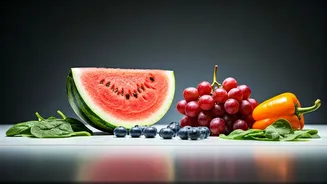The Kidney's Role
The kidneys are vital organs that function as the body's natural filters, removing waste and excess fluids. They also regulate blood pressure, produce
hormones, and maintain a balance of minerals. However, various factors, including poor dietary choices, can impair kidney function, leading to conditions like kidney disease. The good news is that diet plays a crucial role in both preventing and managing kidney problems. Choosing the right foods can help reduce the workload on the kidneys and potentially reverse damage. This article focuses on five foods that are particularly beneficial for kidney health. Incorporating these foods into your diet can be a proactive step towards supporting your kidneys and enhancing overall health. Remember, consulting with a healthcare professional is always advised for personalized dietary recommendations.
Red Bell Peppers
Red bell peppers are a nutritional powerhouse, packed with vitamins, minerals, and antioxidants, while being gentle on the kidneys. They are low in potassium, a mineral that people with kidney issues often need to limit. These peppers are rich in Vitamin C, an antioxidant that helps protect cells from damage. Moreover, red bell peppers contain Vitamin A, which is essential for immune function and overall health. They also provide fiber, which aids in digestion and helps regulate blood sugar levels. Whether you enjoy them raw in salads, roasted as a side dish, or added to stews, red bell peppers are a versatile and delicious way to support your kidneys. The low potassium content makes them an excellent choice for those managing kidney problems. Make them a regular part of your meals to reap the benefits of their protective properties.
Cabbage's Benefits
Cabbage is another excellent addition to a kidney-friendly diet. Similar to red bell peppers, cabbage is low in potassium, making it suitable for those with kidney concerns. It is an affordable and easily accessible vegetable available year-round. Cabbage provides essential vitamins like Vitamin K and Vitamin C, both crucial for various bodily functions. Vitamin K is vital for blood clotting, while Vitamin C supports the immune system. Cabbage also contains fiber, which aids in digestion and helps to regulate cholesterol levels. It can be consumed in various forms, including raw salads, cooked dishes, and fermented as sauerkraut. Integrating cabbage into your diet is a simple and effective way to promote kidney health and overall well-being. Its versatility allows for easy incorporation into various recipes, ensuring you can enjoy its benefits regularly.
Cauliflower's Advantages
Cauliflower offers a multitude of health benefits and is an excellent choice for kidney health. Like cabbage and red bell peppers, cauliflower is low in potassium, aligning with the dietary needs of individuals managing kidney issues. This cruciferous vegetable is a good source of Vitamin C, fiber, and folate. Vitamin C acts as an antioxidant, protecting cells from damage, while fiber supports healthy digestion. Folate is crucial for cell growth and function. Cauliflower can be prepared in various ways, such as steaming, roasting, or pureeing to make a versatile addition to your meals. It can be a great substitute for high-carbohydrate foods like rice or mashed potatoes. By including cauliflower in your diet, you're providing your body with essential nutrients while supporting kidney function. The flexibility of cauliflower in the kitchen makes it an easy win for your health.
Onions' Protective Power
Onions are flavorful and packed with nutrients, offering significant benefits for kidney health. They contain compounds that can help protect against oxidative damage, reducing the risk of kidney-related issues. Onions are a good source of antioxidants, especially quercetin, which has anti-inflammatory properties. These antioxidants help protect cells from damage caused by free radicals. Onions are also low in potassium, making them suitable for those with kidney problems. They add flavor to your meals and can enhance kidney health. Whether cooked or raw, onions can be incorporated into various dishes. Consider adding them to your salads, stews, or stir-fries to enjoy their health benefits. Including onions in your diet is a flavorful and effective way to support your kidneys, adding taste and wellness to your meals.














